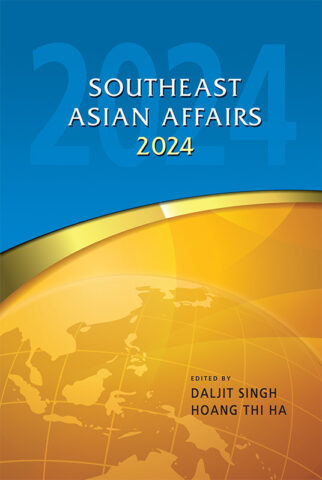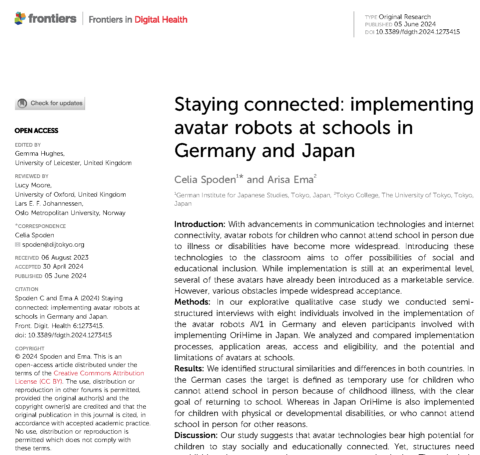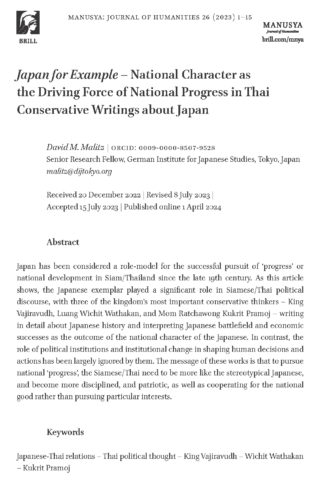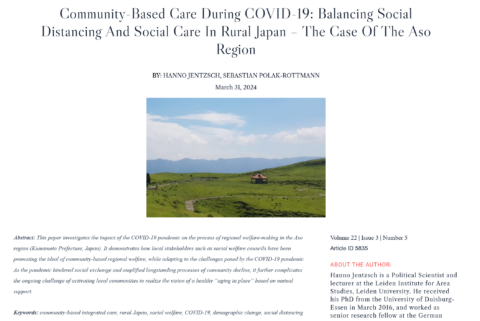Events and Activities
Hybrid Study Group on Taiwanese Dissidents and Japan

This talk explores a series of deportations of Taiwanese dissidents from Japan that occurred between 1967 and 1968. The four individuals in question faced the threat of death penalty in Taiwan for political crimes. The presentation demonstrates that these deportations, along with the resistance they sparked, had a profound and lasting impact on both Taiwan and Japan. They played a crucial role in the failure of the Japanese government’s attempts to toughen immigration laws, led to a series of court rulings that eventually established a de facto right to asylum in Japan by 1971, and resulted in the founding of Amnesty International Japan. These events also triggered an ideological shift within the Taiwanese independence movement and led to its ongoing entanglement with the international human rights movement. Details and registration here
New book chapter by David M. Malitz on Thailand-Japan Relations
 The book chapter “Beyond the Comprehensive Strategic Partnership: Taking Stock of Thailand-Japan Relations” by DIJ researcher David M. Malitz provides an overview of the development of Japanese-Thai relations leading to the Comprehensive Strategic Partnership in November 2022. David explains that due to demographic and technological change as well as the necessary transition to more sustainable economic development, the partnership’s economic backbone is faced with challenges. Nevertheless, and despite the growing influence of the People’s Republic of China, it is far too early to consider the Japanese-Thai economic partnership in terminal decline. Due to its importance for both sides, both governments have already declared their commitment to support it and make it fit for the future. Japan’s considerable soft power will be a major asset for this endeavour, the chapter concludes. David’s chapter is published in Southeast Asian Affairs 2024 (ISEAS – Yusof Ishak Institute), edited by Daljit Singh and Hoang Thi Ha.
The book chapter “Beyond the Comprehensive Strategic Partnership: Taking Stock of Thailand-Japan Relations” by DIJ researcher David M. Malitz provides an overview of the development of Japanese-Thai relations leading to the Comprehensive Strategic Partnership in November 2022. David explains that due to demographic and technological change as well as the necessary transition to more sustainable economic development, the partnership’s economic backbone is faced with challenges. Nevertheless, and despite the growing influence of the People’s Republic of China, it is far too early to consider the Japanese-Thai economic partnership in terminal decline. Due to its importance for both sides, both governments have already declared their commitment to support it and make it fit for the future. Japan’s considerable soft power will be a major asset for this endeavour, the chapter concludes. David’s chapter is published in Southeast Asian Affairs 2024 (ISEAS – Yusof Ishak Institute), edited by Daljit Singh and Hoang Thi Ha.
POSTPONED Hybrid Study Group on Industrial Policy and Technology Transfer in Postwar Japan

Please note: this session of the DIJ Study Group is postponed until further notice
Was the postwar economic miracle a result of the Japanese government’s industrial policy, or did it occur despite it? Numerous studies on the effects of government policy on industrial growth have produced contradictory or inconclusive findings. In this talk, Krautter argues that one of the main instruments of industrial policy toward growth industries was the licensing system for technology imports. Focusing on technology policy, he finds that the licensing system positively influenced the terms and conditions of technology imports. Krautter contends that the government’s role in postwar industrial development was more that of a coordinator rather than of a “leader” or “guide.” This view is reflected in the description of the Japanese state as a coordination state, contrasting with the well-known concept of the developmental state.
Hybrid Study Group on Attitudes Toward Facial Analysis AI
 Computer vision AI systems present one of the most radical technical transformations of our time. Such systems are given unparalleled epistemic power to impose meaning on visual data despite their inherent ambiguity. This becomes particularly evident in computer vision AI that interprets the meaning of human faces in face recognition or emotion expression systems. Despite scientific, social and political concerns, facial analysis AI systems are widely deployed also in Japan, for example, for training employees to show certain facial expressions. This talk presents findings from a study of public perceptions of facial analysis AI across Argentina, Kenya, Japan, and the USA. It reveals similarities in justification patterns but also significant intra-country and inter-country diversity in response to different facial inferences. The study suggests that there is no “common sense” facial classification that accords with a general, homogeneous “human intuition”. Details and registration here
Computer vision AI systems present one of the most radical technical transformations of our time. Such systems are given unparalleled epistemic power to impose meaning on visual data despite their inherent ambiguity. This becomes particularly evident in computer vision AI that interprets the meaning of human faces in face recognition or emotion expression systems. Despite scientific, social and political concerns, facial analysis AI systems are widely deployed also in Japan, for example, for training employees to show certain facial expressions. This talk presents findings from a study of public perceptions of facial analysis AI across Argentina, Kenya, Japan, and the USA. It reveals similarities in justification patterns but also significant intra-country and inter-country diversity in response to different facial inferences. The study suggests that there is no “common sense” facial classification that accords with a general, homogeneous “human intuition”. Details and registration here
New open access article co-authored by Celia Spoden on avatar robots in schools
 With advancements in communication technologies and internet connectivity, avatar robots for children who cannot attend school in person due to illness or disabilities have become more widespread. Introducing these technologies to the classroom aims to offer possibilities of social and educational inclusion. While implementation is still at an experimental level, several of these avatars have already been introduced as a marketable service. However, various obstacles impede widespread acceptance. In the open access research article “Staying connected: implementing avatar robots at schools in Germany and Japan”, DIJ’s Celia Spoden and Arisa Ema (University of Tokyo) identify structural similarities and differences in both countries. Their study, published in Frontiers in Digital Health, suggests that avatar technologies bear high potential for children to stay socially and educationally connected.
With advancements in communication technologies and internet connectivity, avatar robots for children who cannot attend school in person due to illness or disabilities have become more widespread. Introducing these technologies to the classroom aims to offer possibilities of social and educational inclusion. While implementation is still at an experimental level, several of these avatars have already been introduced as a marketable service. However, various obstacles impede widespread acceptance. In the open access research article “Staying connected: implementing avatar robots at schools in Germany and Japan”, DIJ’s Celia Spoden and Arisa Ema (University of Tokyo) identify structural similarities and differences in both countries. Their study, published in Frontiers in Digital Health, suggests that avatar technologies bear high potential for children to stay socially and educationally connected.
Open access article on Japan as model in Thai conservative writings
 Japan has been considered a role-model for the successful pursuit of ‘progress’ or national development in Siam/Thailand since the late 19th century. As Senior Research Fellow David M. Malitz shows, the Japanese exemplar played a significant role in Siamese/Thai political discourse, with three of the kingdom’s most important conservative thinkers writing in detail about Japanese history. They interpret Japanese battlefield and economic successes as the outcome of the national character of the Japanese. The message of these works is that to pursue national ‘progress’, the Siamese/Thai need to be more like the stereotypical Japanese, and become more disciplined, and patriotic, as well as cooperating for the national good rather than pursuing particular interests. “Japan for Example – National Character as the Driving Force of National Progress in Thai Conservative Writings about Japan” (Manusya: Journal of Humanities, 26(1), 1-15) is available open access here
Japan has been considered a role-model for the successful pursuit of ‘progress’ or national development in Siam/Thailand since the late 19th century. As Senior Research Fellow David M. Malitz shows, the Japanese exemplar played a significant role in Siamese/Thai political discourse, with three of the kingdom’s most important conservative thinkers writing in detail about Japanese history. They interpret Japanese battlefield and economic successes as the outcome of the national character of the Japanese. The message of these works is that to pursue national ‘progress’, the Siamese/Thai need to be more like the stereotypical Japanese, and become more disciplined, and patriotic, as well as cooperating for the national good rather than pursuing particular interests. “Japan for Example – National Character as the Driving Force of National Progress in Thai Conservative Writings about Japan” (Manusya: Journal of Humanities, 26(1), 1-15) is available open access here
New open access paper on social care in rural Japan

How can local stakeholders activate the local community to prevent regional care systems from collapsing? Through the lens of challenges posed by the COVID-19 pandemic, this study by DIJ political scientist Sebastian Polak-Rottmann and DIJ alumnus Hanno Jentzsch (Leiden University) reveals the strengths and weaknesses of community-based regional welfare-making in Aso (Kumamoto Prefecture). Their data demonstrates that in the Aso region longstanding social ties, trust, and mutual support constitute the normative underpinning and the concrete social foundation for preventive old age care, based on routine cooperation between communities, volunteers, and social welfare councils. However, as the pandemic hindered social exchange and amplified processes of community decline, it further challenges local communities to realize the vision of a healthy “aging in place” based on mutual support. The paper “Community-Based Care During COVID-19: Balancing Social Distancing and Social Care in Rural Japan – The Case of the Aso Region” (Asia-Pacific Journal. Japan Focus, March 2024) is available open access here.
Call for Papers: Workshop ‘Imagined Futures in Japan and Beyond’
 The DIJ, in collaboration with the German Centre for Research and Innovation (DWIH) Tokyo, is hosting an interdisciplinary workshop delving into both fictional and nonfictional portrayals of Japan’s technological future. We will juxtapose these visions with those from other cultures and analyze them through the lens of “narrative” and “sociotechnical imaginary” theoretical frameworks. Scholars whose research aligns with the thematic scope of our workshop are invited to send their abstracts for their planned presentations via E-Mail to mueller@dijtokyo.org by June 15, 2024. We welcome paper proposals by scholars from different career stages (including PhD students) and from a variety of cultural and disciplinary backgrounds. Participants who are accepted for the workshop will be notified by July 5, 2024. Before submitting your abstract, please see the full Call for Papers here
The DIJ, in collaboration with the German Centre for Research and Innovation (DWIH) Tokyo, is hosting an interdisciplinary workshop delving into both fictional and nonfictional portrayals of Japan’s technological future. We will juxtapose these visions with those from other cultures and analyze them through the lens of “narrative” and “sociotechnical imaginary” theoretical frameworks. Scholars whose research aligns with the thematic scope of our workshop are invited to send their abstracts for their planned presentations via E-Mail to mueller@dijtokyo.org by June 15, 2024. We welcome paper proposals by scholars from different career stages (including PhD students) and from a variety of cultural and disciplinary backgrounds. Participants who are accepted for the workshop will be notified by July 5, 2024. Before submitting your abstract, please see the full Call for Papers here





 Open Access
Open Access
